基于TimeStream對接Prometheus+Grafana實(shí)現(xiàn)可觀測性
TimeStream是阿里云Elasticsearch團(tuán)隊(duì)自研,并結(jié)合Elastic社區(qū)時(shí)序類產(chǎn)品特性共建的時(shí)序引擎。阿里云Elasticsearch支持無縫對接Prometheus+Grafana,支持Prometheus Query相關(guān)的API,可以直接將TimeStream索引作為Grafana的Prometheus數(shù)據(jù)源使用,能夠提高時(shí)序指標(biāo)數(shù)據(jù)存儲與查詢分析的性能,同時(shí)節(jié)約成本。本文介紹如何基于ElasticSearch TimeStream時(shí)序引擎對接Prometheus+Grafana實(shí)現(xiàn)云原生的可觀測性。
背景信息
Prometheus本地存儲會遇到以下問題:
存儲無副本,本地集群機(jī)器宕機(jī)后,Prometheus將無法訪問。
單機(jī)存儲,隨著數(shù)據(jù)量不斷上漲,可能遇到硬件瓶頸,無法橫向擴(kuò)容。
數(shù)據(jù)無備份能力,硬盤損壞后,數(shù)據(jù)可能無法恢復(fù)。
本地磁盤存儲成本高,無法進(jìn)行冷熱分離存儲。
因此在Prometheus的高可用方案中,在存儲側(cè),推薦使用分布式、高可用的遠(yuǎn)端存儲。阿里云Elasticsearch的TimeStream引擎提供了對Prometheus遠(yuǎn)端存儲和查詢的能力,基于Elasticsearch的分布式、彈性、高可用、備份和冷熱分層存儲等能力,可以作為Prometheus遠(yuǎn)端存儲的最佳選擇之一。
阿里云Elasticsearch與Prometheus和Grafana的結(jié)合方式如下圖所示。
原理說明如下:
Prometheus收集各個(gè)Exporter的數(shù)據(jù)。
Prometheus通過remote write的方式將收集的數(shù)據(jù)同步到Elasticsearch。
用戶通過Kibana和Grafana查看Prometheus同步到Elasticsearch中的數(shù)據(jù)。
說明在使用Grafana訪問Elasticsearch中的數(shù)據(jù)時(shí),除了可以使用原生的Elasticsearch DataSource,還可以使用Prometheus的DataSource直接訪問Elasticsearch數(shù)據(jù),并使用PromQL來查看指標(biāo)數(shù)據(jù)。
前提條件
已創(chuàng)建阿里云Elasticsearch實(shí)例,且實(shí)例版本為通用商業(yè)版7.16及以上、內(nèi)核版本為1.7.0及以上,或者實(shí)例版本為通用商業(yè)版7.10、內(nèi)核版本為1.8.0及以上。具體操作請參見創(chuàng)建阿里云Elasticsearch實(shí)例。
操作流程
步驟一:環(huán)境準(zhǔn)備
創(chuàng)建通用商業(yè)版7.16版本的阿里云Elasticsearch實(shí)例。
創(chuàng)建一個(gè)ECS實(shí)例,該實(shí)例要與步驟一中創(chuàng)建的Elasticsearch實(shí)例在相同專有網(wǎng)絡(luò)下,且選擇Linux操作系統(tǒng)。
創(chuàng)建ECS實(shí)例的具體操作,請參見自定義購買實(shí)例。該ECS實(shí)例用來訪問阿里云Elasticsearch實(shí)例,并部署Prometheus和Grafana,實(shí)現(xiàn)阿里云Elasticsearch與Prometheus和Grafana的結(jié)合。
創(chuàng)建一個(gè)接收Prometheus數(shù)據(jù)的Elasticsearch TimeStream索引。
登錄目標(biāo)阿里云Elasticsearch實(shí)例的Kibana控制臺,根據(jù)頁面提示進(jìn)入Kibana主頁。
登錄Kibana控制臺的具體操作,請參見登錄Kibana控制臺。
在左側(cè)導(dǎo)航欄,單擊
 圖標(biāo),然后選擇。
圖標(biāo),然后選擇。在控制臺中,執(zhí)行
PUT _time_stream/prom_index命令,創(chuàng)建名稱為prom_index的TimeStream索引。
步驟二:下載并啟動(dòng)node_exporter
node_exporter用于收集各種與硬件和內(nèi)核相關(guān)的指標(biāo),并提供給Prometheus進(jìn)行讀取,詳細(xì)信息請參見node_exporter。
連接ECS實(shí)例。
具體操作請參見通過密碼或密鑰認(rèn)證登錄Linux實(shí)例。
說明本文檔以普通用戶權(quán)限為例。
下載node_exporter安裝包。
本示例以node_exporter 1.3.1版本為例,下載命令如下。
wget https://github.com/prometheus/node_exporter/releases/download/v1.3.1/node_exporter-1.3.1.linux-amd64.tar.gz解壓安裝包并啟動(dòng)node_exporter。
tar xvfz node_exporter-1.3.1.linux-amd64.tar.gz cd node_exporter-1.3.1.linux-amd64 ./node_exporter
步驟三:下載、配置并啟動(dòng)Prometheus
連接ECS實(shí)例。
具體操作請參見通過密碼或密鑰認(rèn)證登錄Linux實(shí)例。
在根目錄下載Prometheus安裝包。
本示例以Prometheus 2.36.2版本為例,下載命令如下。
cd ~ wget https://github.com/prometheus/prometheus/releases/download/v2.36.2/prometheus-2.36.2.linux-amd64.tar.gz解壓Prometheus安裝包。
tar xvfz prometheus-2.36.2.linux-amd64.tar.gz在Prometheus目錄的prometheus.yml文件中,配置node_exporter和remote_write。
cd prometheus-2.36.2.linux-amd64 vim prometheus.yml配置示例如下。
scrape_configs: # The job name is added as a label `job=<job_name>` to any timeseries scraped from this config. - job_name: 'prometheus' # metrics_path defaults to '/metrics' # scheme defaults to 'http'. static_configs: - targets: ['localhost:9090'] #配置node_exporter - job_name: "node" static_configs: - targets: ["127.0.0.1:9100"] #配置remote_write,確保Prometheus能夠訪問Elasticsearch集群,即網(wǎng)絡(luò)是通的。 remote_write: - url: "http://xxx:9200/_time_stream/prom_write/prom_index" basic_auth: username: elastic password: xxxx參數(shù)
說明
node_exporter
配置node_exporter的連接信息。targets需要配置為node_exporter的訪問地址:端口。
由于本示例使用同一個(gè)ECS實(shí)例部署Prometheus和node_exporter,因此node_exporter的訪問地址使用本地訪問IP地址127.0.0.1,端口使用默認(rèn)的9100端口。
remote_write
配置Elasticsearch實(shí)例的TimeStream索引的連接信息。需要配置以下基礎(chǔ)參數(shù),更多高級參數(shù)請參見remote_write。
url:訪問TimeStream索引的URL,格式為:http://<Elasticsearch實(shí)例的公網(wǎng)或私網(wǎng)訪問地址>:9200/_time_stream/prom_write/<yourTimeStreamIndex>。
說明Elasticsearch實(shí)例的公網(wǎng)或私網(wǎng)訪問地址:可在Elasticsearch實(shí)例的基本信息頁面獲取。如果Prometheus所部署的ECS實(shí)例與Elasticsearch實(shí)例在同一VPC下,可使用私網(wǎng)訪問地址(本文以此為例);如果不在同一VPC下,需要使用公網(wǎng)訪問地址,并且要配置公網(wǎng)訪問白名單,詳細(xì)信息請參見配置實(shí)例公網(wǎng)或私網(wǎng)訪問白名單。
<yourTimeStreamIndex>:用于接收Prometheus數(shù)據(jù)的Elasticsearch TimeStream索引,該索引需要提前創(chuàng)建,本文以prom_index索引為例。
username:訪問TimeStream索引的用戶名,默認(rèn)為管理員賬號elastic。您也可以使用自建用戶,但需確保自建用戶具有訪問與操作TimeStream索引的權(quán)限,詳細(xì)信息請參見通過Elasticsearch X-Pack角色管理實(shí)現(xiàn)用戶權(quán)限管控。
password:訪問TimeStream索引的用戶對應(yīng)的密碼。elastic賬號的密碼在創(chuàng)建實(shí)例時(shí)設(shè)定,如果忘記可重置,重置密碼的注意事項(xiàng)和操作步驟請參見重置實(shí)例訪問密碼。
啟動(dòng)Prometheus。
./prometheus驗(yàn)證Prometheus數(shù)據(jù)是否已經(jīng)同步到Elasticsearch的TimeStream索引中。
在Elasticsearch的Kibana控制臺中,執(zhí)行以下命令進(jìn)行驗(yàn)證:
查看prom_index索引是否已經(jīng)有數(shù)據(jù)。
GET _cat/indices/prom_index?v&s=i預(yù)期結(jié)果如下。

確認(rèn)是否能查詢到數(shù)據(jù)并查看數(shù)據(jù)內(nèi)容。
GET prom_index/_search預(yù)期結(jié)果如下。
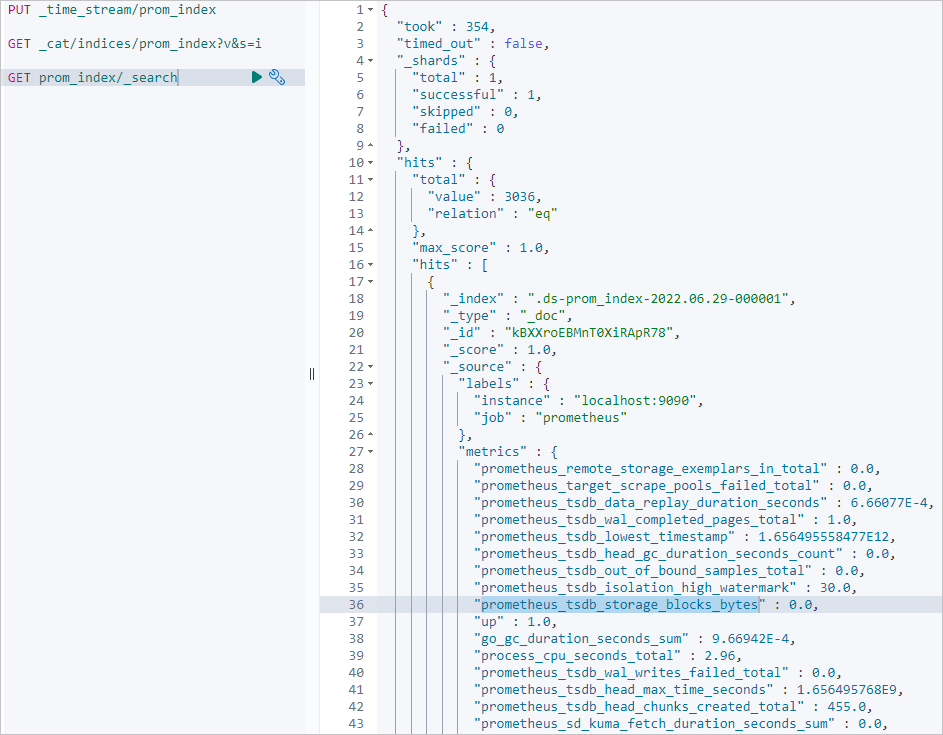
步驟四:下載、啟動(dòng)并配置Grafana Dashboard
連接ECS實(shí)例。
具體操作請參見通過密碼或密鑰認(rèn)證登錄Linux實(shí)例。
在根目錄下載Grafana安裝包。
本示例以Grafana 9.0.2版本為例,下載命令如下。
cd ~ wget https://dl.grafana.com/enterprise/release/grafana-enterprise-9.0.2.linux-amd64.tar.gz解壓Grafana安裝包并啟動(dòng)。
tar xvfz grafana-enterprise-9.0.2.linux-amd64.tar.gz cd grafana-9.0.2 ./bin/grafana-server在瀏覽器中輸入Grafana的訪問地址
http://<ECS的公網(wǎng)IP地址>:3000,進(jìn)入Grafana登錄頁面,輸入用戶名和密碼進(jìn)入Grafana控制臺。首次登錄Grafana控制臺需要使用默認(rèn)用戶名和密碼,均為admin。登錄后,系統(tǒng)會提示修改密碼,密碼修改完成后即可進(jìn)入Grafana控制臺。
ECS的公網(wǎng)IP地址:進(jìn)入ECS管理控制臺,在對應(yīng)實(shí)例的IP地址列獲取。

Grafana的默認(rèn)訪問端口號為3000,在瀏覽器中訪問3000端口時(shí),需要配置ECS的入方向的安全組規(guī)則,設(shè)置目的為3000,源為您客戶端的IP地址。詳細(xì)信息請參見添加安全組規(guī)則。

在Grafana中,創(chuàng)建Prometheus的DataSource。
在Grafana控制臺的左側(cè)導(dǎo)航欄,選擇。
在Data sources頁簽,單擊Add data source。
在Time series databases列表中,單擊Prometheus。
在Settings頁簽中,配置Prometheus數(shù)據(jù)源信息。
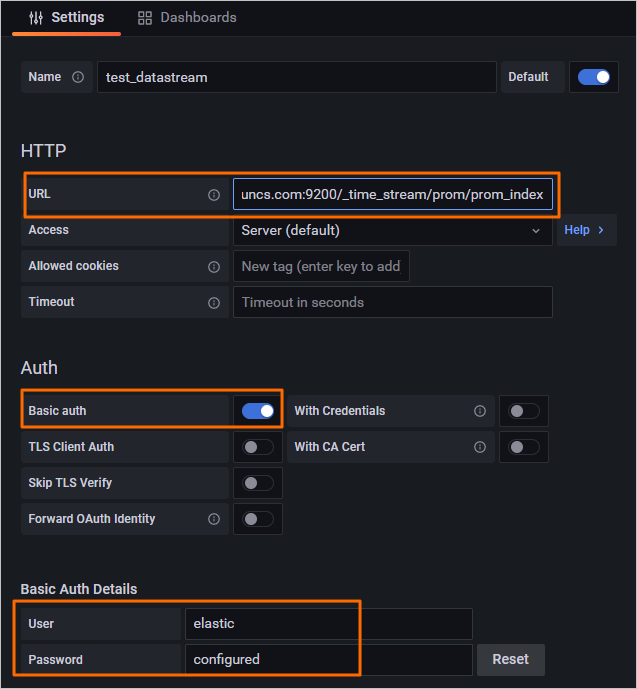
本文中必須配置的參數(shù)說明如下。
參數(shù)
說明
URL
訪問TimeStream索引的URL,格式為:http://<Elasticsearch實(shí)例的公網(wǎng)或私網(wǎng)訪問地址>:9200/_time_stream/prom/<yourTimeStreamIndex>。
說明Elasticsearch實(shí)例的公網(wǎng)或私網(wǎng)訪問地址:可在Elasticsearch實(shí)例的基本信息頁面獲取。如果Prometheus所部署的ECS實(shí)例與Elasticsearch實(shí)例在同一VPC下,可使用私網(wǎng)訪問地址(本文以此為例);如果不在同一VPC下,需要使用公網(wǎng)訪問地址,并且要配置公網(wǎng)訪問白名單,詳細(xì)信息請參見配置實(shí)例公網(wǎng)或私網(wǎng)訪問白名單。
<yourTimeStreamIndex>:用于接收Prometheus數(shù)據(jù)的Elasticsearch TimeStream索引,該索引需要提前創(chuàng)建,本文以prom_index索引為例。
Basic auth
是否開啟Elasticsearch實(shí)例的Basic auth認(rèn)證。開啟后需要配置訪問Elasticsearch實(shí)例的用戶名和密碼。
User
訪問TimeStream索引的用戶名,默認(rèn)為管理員賬號elastic。您也可以使用自建用戶,但需確保自建用戶具有訪問與操作TimeStream索引的權(quán)限,詳細(xì)信息請參見通過Elasticsearch X-Pack角色管理實(shí)現(xiàn)用戶權(quán)限管控。
訪問TimeStream索引的用戶對應(yīng)的密碼。elastic賬號的密碼在創(chuàng)建實(shí)例時(shí)設(shè)定,如果忘記可重置,重置密碼的注意事項(xiàng)和操作步驟請參見重置實(shí)例訪問密碼。
單擊Save&test。
配置成功后,系統(tǒng)提示Data source is working。
在Grafana中,創(chuàng)建展示Prometheus數(shù)據(jù)源的Dashboard。
在Grafana控制臺的左側(cè)導(dǎo)航欄,選擇。
單擊Add a new panel。
選擇Data source和查詢時(shí)間,單擊Run queries查詢數(shù)據(jù)。
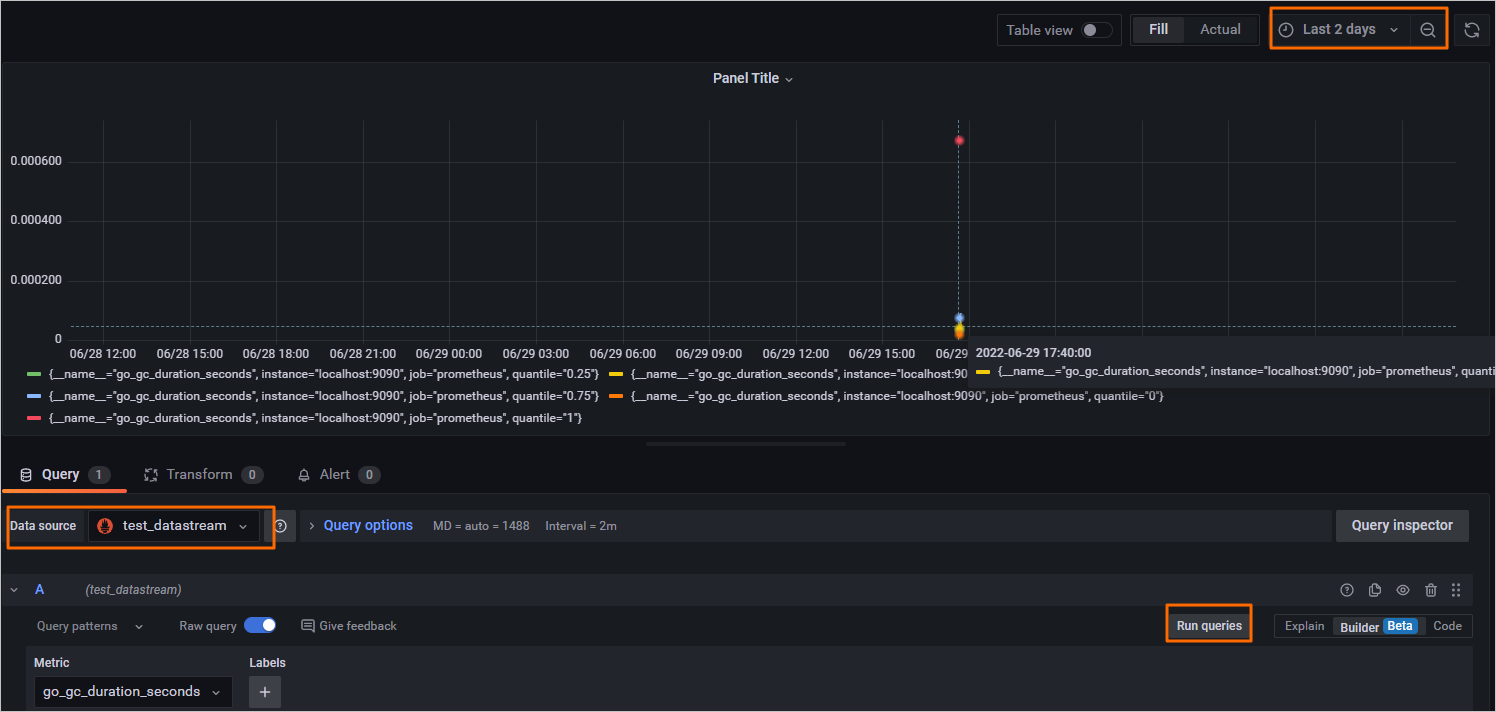
單擊右上角的Save,保存Dashboard。
在Grafana中,導(dǎo)入node_exporter自帶的Grafana Dashboard,并配置Prometheus數(shù)據(jù)源,生成指標(biāo)監(jiān)控Dashboard。
在Grafana控制臺的左側(cè)導(dǎo)航欄,選擇。
在Import via grafana.com文本框中,填寫node_exporter的Grafana地址或ID:即https://grafana.com/grafana/dashboards/1860或1860。

單擊Load。
在配置頁面選擇Prometheus數(shù)據(jù)源為您已創(chuàng)建的數(shù)據(jù)源。
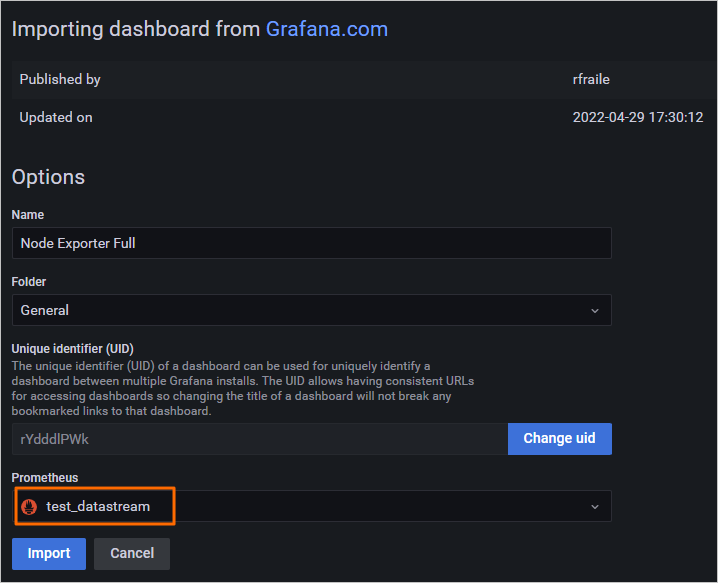
單擊Import。
在Dashboard頁面右上角,選擇查詢時(shí)間,查看對應(yīng)時(shí)間段內(nèi)的指標(biāo)監(jiān)控Dashboard。
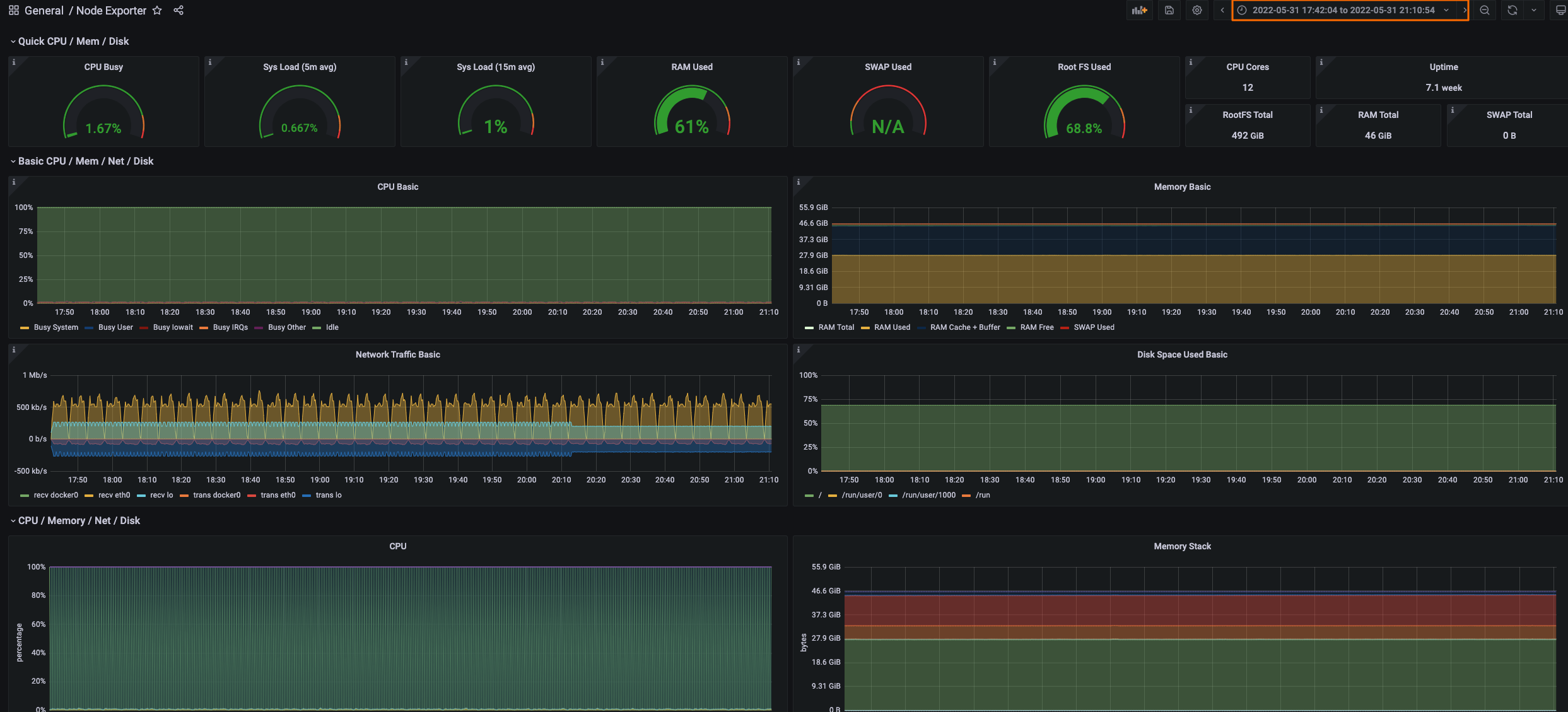 說明
說明關(guān)于Grafana更詳細(xì)的操作教程,請參見Grafana documentation。
 > Data sources
> Data sources > New dashboard
> New dashboard